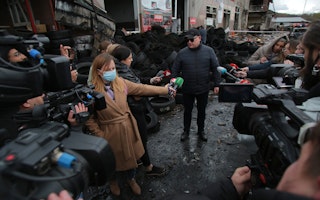Fines Threaten Media Freedom in Armenia
By Tatevik Melikyan
Last May, it looked like Armenia was headed in the right direction when it decriminalized libel and slander. After pressure from the Organization for Security and Co-operation in Europe (OSCE), the Council of Europe, and national media professional organizations, the country finally joined a handful of other European countries—Bosnia and Herzegovina, Cyprus, Estonia, Georgia, Moldova, Ukraine and the United Kingdom—when its National Assembly decriminalized libel and slander. Journalists would no longer face the threat of jail time for writing a critical article about a public official; however, media outlets could be liable for a fine of up to $8,000.
Despite accolades from the OSCE and other international organizations, Article 1087.1 of Armenia’s Civil Code—which now provides compensation for “damage to honor, dignity and business reputation”—has been skillfully used by the authorities as a tool to stifle the press and exert legal, political, and economic pressure against “unwanted” media.
More than 10 cases have been initiated in the past several months against Armenia’s print media. Oligarchs, politicians, and even former president Robert Kocharyan, have claimed to be victims of libel and slander and demanded “justice” by having print media pay hefty fines to restore the honor of their family name. So far the courts have applied the maximum fines—up to $2,700 for libel and $5,400 for slander—in all of the cases that have gone to trial. In a country where newspapers cost 100 Armenian drams (around $0.27) and the average circulation is less than 3,000 copies, these fines are challenging the very existence of print media in Armenia.
Levon Barseghyan, chairman of Asparez Journalists’ Club, an outspoken professional media organization in Armenia, said of the fines: “While I think that there was no alternative to decriminalization of libel and slander, the amount of fines for slander and the total dependence of courts on the executive turned it into a 'legitimate axe' over media. A consequence of this will be an increase in self-censorship and blossoming of lyrical journalism vs. informative and analytical journalism.”
Armenian media organizations spoke out in May, criticizing the authorities for using the civil code to silence offending press. But while hefty fines are being used to silence critics, the news environment in Armenia leans toward yellow press—there is a lack of professionalism and understanding of balanced coverage by many journalists. But regardless of the situation, libel lawsuits are quickly creating an environment where all critical coverage and investigative journalism is silenced—no matter its validity.
Ashot Melikyan, chairman of the Committee to Protect Freedom Expression in Armenia, an organization that recently published its first quarterly report in 2011 on cases of pressure against media and violence against journalists, had this to say: “Our assessment of the situation is the following, that this parade of court cases against media is not only due to libel and slander in the publications, but more due to intolerance of criticism especially by politicians. We see this as nothing else but an attempt to silence the unwanted media.”
Still the number of cases continues to mount. In February 2010, former president Kocharyan and his family launched a case against Zhamanak newspaper publishing the names of businesses allegedly owned by the family. The lawsuit claimed that the newspaper had published information that could not be proved with the aim of discrediting the family. This past June, a court ordered the newspaper to publish a retraction and pay 3 million Armenian drams ($8,100) for the damage to the “honor, dignity, and business reputation” of the Kocharyan family.
While the Open Society Foundations–Armenia supported media organizations in their efforts to decriminalize libel and slander and worked closely with the international organizations to achieve this goal, the nature of the changes made to the Civil Code leaves room for manipulation and abuse. The Civil Code mentions a maximum amount of the fine but provides no criteria for applying maximum punishment. As a result, judges may indiscriminately apply the maximum charges against journalists and/or the print media. Statements made by media organizations have been a first step in the efforts to raise the problem.
The foundation’s Strategic Litigation Program is now looking into a case where the print and online newspaper Hetq, produced by the Association of Investigative Journalists NGO, was fined $3,000 for writing and publishing an article about illegal business activities by the mayor of Ijevan, Armenia. With the foundation’s assistance, the decision will be appealed.
Decriminalizing libel and slander in Armenia has been a positive step by and large. However, the move has brought cases from the criminal court to the administrative court and opened up new punitive opportunities for critical media. Over the past two years, the foundation’s monitoring of the administrative courts has revealed that the executive exerts a large degree of pressure over administrative courts and their decisions. While journalists no longer face jail time for libel or slander, the change in the Civil Code—and the number of lawsuits brought in such a short period—has created another problem. Financial punishment can have an even greater impact in silencing the media than jailing a journalist, and it poses a real threat for print media’s existence.
Media organizations have voiced their concerns on numerous occasions but have yet to come together to draft legislative amendments to the Civil Code in order to limit possibilities for abuse and stop the process of punishing media. In addition, work must be done with media outlets to emphasize the importance of balanced coverage and professionalize Armenia’s media, which will help journalists and news outlets avoid being easy targets.
Until December 2011, Tatevik Melikyan was a program coordinator with the Open Society Foundations–Armenia.


